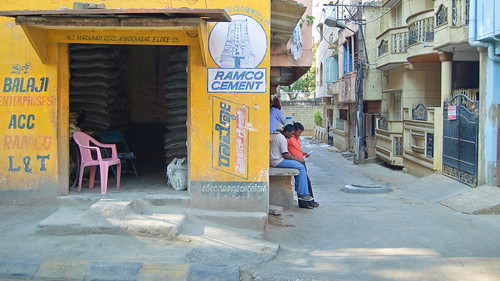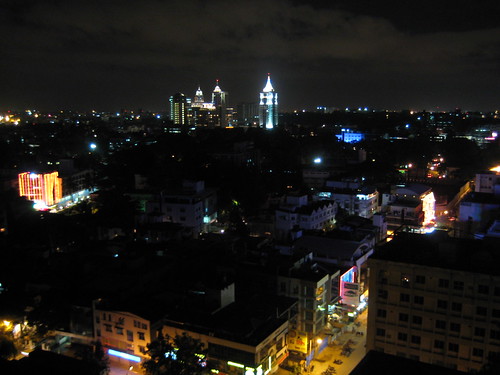This week’s Aspiring Voices guest is Nancy Zrymiak, bringing a welcome look into the non-fiction scene. She’s working on a book about her time spent in India and I was thrilled to get a chance to ask some questions about how the project got started.
Paul: You’re currently working on a book about your two-year relocation from your home in Canada to Bangalore, India. Can you describe a bit about the events that led up to the decision to make the move, and how you arrived at the conclusion that you should transplant your family halfway across the planet?
Nancy: Give me an opportunity and I’ll take it. When my husband came home and told me there was a job possibility in India, I thought it was a crazy idea. But his timing was good. First, it was November, the rainiest, dreariest month in Vancouver. Secondly, I was tired of the the rat race and the routine that comes along with living and parenting in the western world: carpooling, commuting, grocery shopping, packing lunches, making dinners. When I thought about India, I thought about adventure, culture, and travel. Once I began to think of the move as an opportunity, the decision to uproot the family became much easier. The warm weather kind of lured me in too.

Paul: You blogged pretty extensively while you were living in India. What made you want to write a book about that experience as well? Are you finding the book is more an expanded version of the blog or is the blog more a framework you can use to weave stories through that you didn’t discuss at the time? Or are they completely independent of one another?
Nancy: My India blog was more of a travel blog with photos. In the book, I delve into the lives of the people I met in India, especially the locals, and the roller coaster of emotions that they bring to the story. You’ll meet some interesting characters and learn about their daily lives as well as mine. I also write about the misconceptions that I had about India before I went, what I learned about India and what I learned about myself.
Paul: What were some of your misconceptions about the country? Do you think those are pretty typical of how North Americans view India and Indian culture?
Nancy: In the west we tend to hear about the extremely poor people of India and the corrupt rich. So I was surprised to find a growing middle class—university educated, dual income families, living in high rise apartment buildings. I also thought that India relied on western organizations and funds to take care of the poor. But there are countless Indian people volunteering and running charities—taking care of their own people. Yes, I think the media portrays India one way, and that skews our views in the west. I was lucky to be able to live there and see the many different sides to India.
Paul: So you’ve got this story you’re telling that is, in part, about yourself and your encounters and it includes real people you know and your family as characters. And then you have these much broader themes and concepts like foreign culture and the perceptions and expectations, plus a sense of setting and the truths of life in a place many of your readers maybe aren’t all that familiar with. How do you weave those together in a way that is both effective, compelling, and also true to your experience? Does it become sort of an intensely personal book where you say, “Look, I don’t know what is ‘true’ in the objective sense, but this was my experience”, or do you try and pull back a little and dig in to some research that you can use to reconcile your personal observations so it becomes more of a comparison and contrast?
Nancy: It does get a little complicated, trying to weave it all together. For now I’m writing the story chronologically, so I might be writing about something really funny and then all of a sudden some sort of tragedy happens out of the blue. Then I’m left wondering how and why did this happen and can I do anything about it? But that’s India—it’s never boring and you’re always left wondering “What next?” As I write I do add some history and research here and there for interest and that helps tie things together too. I wouldn’t say the book is intensely personal—it’s not a self help book and I didn’t move there to “find myself”—but India definitely changed me and that is part of the story.
Paul: I think life is really full of those odd juxtapositions where lighthearted moments are suddenly contrasted with very somber experiences. In fiction I think this is often done for dramatic effect or as a transitional moment, kind of intentionally jarring. In nonfiction do you feel there are additional narrative or mechanical efforts you need to go to in order to avoid having it seem either awkward or sort of fabricated?
Nancy: Well, as so many people in India said—you just can’t make this stuff up. So I don’t think it will seem fabricated, but yes, the challenge is to make it flow.
Paul: Can you tease a little sample of this in action? What’s something you experienced that made you say, “Can’t make this stuff up”?
Nancy: Okay, long story short. My husband’s work provided us with a driver named Sanjeev—really nice guy, knew all the short cuts. We met his family, went to their house, met his parents, wife, children. One day Sanjeev tells us that his wife had a “family planning” operation. She’s having some problems with the recovery and he wants to take her to Chennai to recover at her parent’s house. He takes her on the overnight train and comes back a few days later. That same afternoon he tells me the doctor in Chennai wants to talk to him in person. He wants to leave right away and he’s arranged for another driver. So he goes, and two days later we get a call from the company that employs Sanjeev. They tell us they saw him on the evening news—he’d been in a huge brawl, he’d been gambling, owed people money. We said, no it can’t be true, he’s in Chennai. But they insisted it was Sanjeev and he was in Bangalore. They wanted us to use a different driver, saying that if people were after Sanjeev they might come after us. So, that’s the short version. Oh, and the driver that Sanjeev arranged for us—turned out to be some guy that didn’t speak English and didn’t know how to drive a van.
Paul: [laughs] Oh my goodness, that’s crazy! Did you ever determine if the story he told you was true or not? Was the operation just a smokescreen?
Nancy: That’s the million dollar question. Believe me, we felt a lot of loyalty to Sanjeev, he’d been with us almost a year. And I used to be an Operating Room nurse, so when he told me about his wife having the operation, I was intrigued and asked him a bunch of questions about it. But why would he take her to Chennai if she wasn’t feeling well, and why couldn’t the doctor talk to him on the phone? I could go on and on—it was really emotional and we got very caught up in trying to be detectives for at least a week. But I’ll leave all that for the book.

Paul: Is the style you’re going for in your book more of a memoir or a personal narrative? Why did you choose the style you’re working with and what are some of the advantages or disadvantages of one versus the other, particularly with the stories you have to tell?
Nancy: The book is a travel memoir. I didn’t consciously choose a style—I just started writing. There’s actually quite a bit of dialogue and interaction with other people. I’m trying to write in such a way that is engaging and keeps people wanting to turn the pages.
Paul: Okay, one more. Describe the best book you’ve read recently.
Nancy: The book I’m reading right now—Dune by Frank Herbert.
Paul: I read that one for the first time last year. I really enjoyed it. Is this a re-read or are you a newcomer to the series?
Nancy: Newcomer, and I’m really enjoying it too.
 Nancy is writing a book about her experiences in India. Nancy, her husband and two children, leave behind the comforts of the Canadian cul-de-sac and move to Bangalore, India for two years. Her book is a vivid and humorous account of their time in India: the beauty, the culture, the people, the believable and the unbelievable. Check out her website, follow her on Twitter, and Like her Facebook page.
Nancy is writing a book about her experiences in India. Nancy, her husband and two children, leave behind the comforts of the Canadian cul-de-sac and move to Bangalore, India for two years. Her book is a vivid and humorous account of their time in India: the beauty, the culture, the people, the believable and the unbelievable. Check out her website, follow her on Twitter, and Like her Facebook page.

[…] Nancy: My India blog was more of a travel blog with photos. In the book, I delve into the lives of the people I met in India, especially the locals, and the roller coaster of emotions that they bring to the story. You’ll meet some interesting characters and learn about their daily lives as well as mine. I also write about the misconceptions that I had about India before I went, what I learned about India and what I learned about myself. Read the rest of the interview. […]